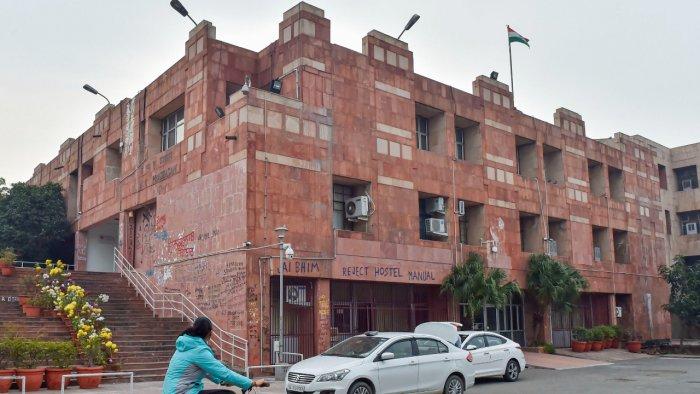JNU: VC Muted Mics and Bulldozed CUCET in Academic Council Meet, Say Teachers

Image Courtesy: PTI
In its Academic Council meeting on Wednesday, Jawaharlal Nehru University (JNU) gave its nod to the contentious Central University Common Entrance Test (CUCET) for admissions from the next academic session. The university has admitted the students through JNU Entrance Examinations conducted by the National Testing Agency (NTA) until now.
The nod came after the University Grants Commission, the regulator of all central universities, asked Vice-Chancellors to expedite the process in a meeting. Jitendra Kumar Tripathi, Joint Secretary, UGC, in his letter in late December last year, had written, "A meeting was held with the vice-chancellors of all the central universities on 22.11.2021 to discuss the recommendations of the committee (constituted to draw the modalities of CUCET) and for conducting a common entrance test. After detailed deliberations, it was resolved that the common entrance test for undergraduate and postgraduate courses may be conducted for central universities from academic session 2022-23 through NTA."
However, the decision has been vehemently criticised by the teachers and students who allege that the move would deprive the university of autonomy over academic affairs, including framing the question papers and subsequent delay in the declaration of results.
Enraged over the sudden inclusion of the matter in the agenda, 111 teachers from different centres and schools wrote a letter to the academic council members requesting them to postpone the matter. The letter read, "The Additional Agenda with regards to the conduct of next year's JNUEE was circulated to members of the Academic Council only on January 10, 2022. Since this is a matter that requires extensive deliberation given the interdisciplinary nature of JNU's programmes of study, we request the Academic Council to refer the agenda item for discussion at the School (BOS) and Centre (Faculty Committee) level."
Avinash Kumar, a faculty member from the Centre for Informal Sector and Labour Studies and an Academic Council member, said that the online meet saw utter disregard for dissenting members who wanted to express their apprehensions over the issue. Talking to NewsClick over the phone, Kumar said that the members were muted in a matter of seconds if anybody wanted to raise the issue.
"In the previous meet, the university administration said that it has included it in the agenda for the discussion. When the meeting began, the VC said that the recommendation had already been adopted. We wanted to say that it is a sensitive matter and the discussion should first happen in centres and schools where it would have been minutely deliberated. We have several centres like Biotechnology and computer sciences, which already conduct national level tests for their admissions. Their press release could not decipher the full form of CUCET. Still, they went ahead with it."
Kumar added that the norms were flouted for forceful adoption of CUCET.
"The UGC began had only begun the discussion over it. It is yet to come up with its regulations. Once these regulations were framed, they were to be discussed and passed in academic and executive council because the JNU is a central university governed by the act," Kumar added.
The conduct of the meet was also questioned by Sadiq Rangwala, senior scientist from Raman Research Centre under the Tata Institute of Fundamental Research.
Moushumi Basu, Secretary, JNU Teachers' Association, said that the matter was introduced even by overlooking set precedents in the university and distorting the facts about the advisory committee's recommendations. In a written statement, she said that the VC selectively orchestrated the discussion on the CUCET, which was sent as an additional agenda Item on January 10, 2022, by stating that decision on the matter had already been taken in the 157th meeting of the Academic Council. This, however, is not true.
"A perusal of the minutes of the 157th meeting of the Academic Council clearly shows that this was not even listed on the agenda of that meeting. It was only part of one of the several recommendations of the advisory committee on admissions which recommended that "in case of receiving any direction from MoE/UGC, the University will accordingly adopt and admit students through CUCET". This clearly means that the adoption of the CUCET was not done in the 157th meeting of the Academic Council. In fact, members of the Academic Council have reported that there was no discussion on CUCET during the 157th AC meeting."
Aishe Ghosh, President, JNU Students' Union, too expressed her reservations about the meet.
"Handing over of the absolute authority to conduct entrance examination(s) to NTA via CUET, as was seen in the recent past (in the case of NTA-JNUEE), raises serious concerns regarding transparency in the entire process. The recurring set of unfair practices the student community time and again raised regarding discrepancies in question papers and answer keys, a non-economical challenging fee, undue delay concerning the declaration of results, we fear, shall only be intensified with CUCET now in the picture."
The students have maintained that the university is paying a huge cost to NTA for conducting computer-based examinations tests even by compromising aid given to students from marginalised sections.
"In addition to losing autonomy (over the setting of question papers, declaration of results) and lacking transparency (indicating pass/fail instead of displaying the student's grade), the proposed CUET with a centralised institutional setup, makes (any) redressal an elaborated procedure, further pushing aspirants belonging to the marginalised communities to deeper margins. Many Universities, including JNU offer programmes and courses that are unique to the university. A one size fits all approach of CUET will be detrimental in this regard and will not be sufficient to accommodate the diverse range of programmes offered in different Universities," Ghosh further said.
Get the latest reports & analysis with people's perspective on Protests, movements & deep analytical videos, discussions of the current affairs in your Telegram app. Subscribe to NewsClick's Telegram channel & get Real-Time updates on stories, as they get published on our website.
























